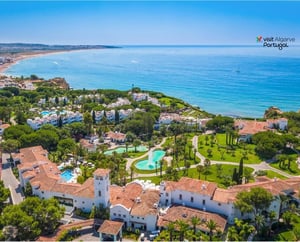Move to Portugal for Tax Free Foreign Pensions
The Non-Habitual Resident tax regime offers substantial tax benefits
Book Top Experiences and Tours in Algarve:
If youʻre booking your trip to Algarve last minute, we have you covered. Below are some of the top tours and experiences!- Algarve: Landscapes, Pottery, and Winery Tour
- From Portimão: Catamaran Cruise to Benagil Caves with BBQ
- Loulé: Quinta da Tôr Winery Guided Tour and Wine Tasting
- Vilamoura: Benagil Cave Boat Tour with Entry&Dolphin search
- Algarve: Krazy World Interactive Park Entry Ticket
All Finance Matters, an accountancy and tax consultancy in Tavira, Algarve explains what the Non-Habitual Resident tax regime is, who is eligible, what the benefits are and how to apply.
The NHR scheme was approved in 2009 and assigns certain tax advantages over a period of 10 years. It was designed to promote Portugal to expats by attracting foreign pensioners to live here, but also to promote the transfer of residence of entrepreneurs, investors and specialized professionals.
Below is detailed information the NHR (non-habitual resident) scheme provided by All Finance Matters.
For a case study and more information visit their website information about living in Portugal.
If you are planning to move to Portugal, or at least thinking about it we have good news. The non-habitual resident (“NHR”) taxation regime; a scheme for new residents that can provide substantial tax benefits, so much that you may discover that Portugal is a tax haven for you.
The non-habitual resident (“NHR”) taxation regime is becoming very popular, in 2016 the number of tax payers under the NHR has increased 44% and although the numbers for 2017 have not been released yet, it’s expected to increase again this year.
According to the tax authorities the tax exemption to these citizens, totaled 166M € in 2015 (the tax authorities have not released any other data for 2016 and 2017). However, the impact on the tax revenue of the arrival of these residents turns out to be positive because they pay taxes on income generated in Portugal, for example capital gains, besides the rates associated with consumption, the property transfer taxes and stamp duty. There are also significant impacts on local economies, on the real estate market and urban rehabilitation.
The NHR is proving very successful at attracting individuals of independent means, pensioners and certain skilled professionals to establish residency in Portugal for tax purposes, while not being subject to any minimum or maximum stay requirements.
In addition to the non-existence in Portugal of wealth tax, or of inheritance/gift tax for close relatives, the NHR regime essentially grants qualifying individuals the possibility of becoming tax residents of a white-listed jurisdiction whilst legally avoiding or minimising income tax on certain categories of income and capital gains for a minimum period of 10 years.
A major feature of the NHR regime lies in its interaction with the double tax conventions signed by Portugal or with the OECD model tax convention in the absence of one. In effect, most double tax conventions (of which Portugal signed 87) grants the possibility to tax most categories of income to the country of source of such income, although in practice, so as to attract foreign investment, many countries will not make use of that possibility to tax non-residents. Since most such categories will not be taxed in Portugal in the hands of a NHR because they may be taxed abroad, in practice most foreign-source income types will be zero taxed in such hands.
Under the NHR regime, the following categories of foreign-source income and capital gains (except if sourced from a blacklisted tax haven which has not signed a double tax convention with Portugal) will be generally exempt from income tax in Portugal since they may generally be taxed in the source country, even though they will not often be taxed in the hands of non-residents in the latter country either:
- Profits derived from eligible occupations
- Royalties and associated income
- Dividends, interest and real estate income
- Capital gains from the alienation of real estate (including shares deriving more than 50% of their value from real estate) and of ships or aircraft operated in international traffic
It should be noted that several countries often deemed “offshore tax havens” do have double tax conventions with Portugal and are therefore white-listed for the purposes of the NHR regime. In addition, all EU member states are white-listed, even though several such states may in many ways be used as “offshore tax havens”, especially by non-residents from that country.
Occupational pensions will be tax exempt in Portugal as long as they may not be deemed sourced from Portugal.
Foreign-source income from employment (including fees of directors and entertainers or sportsmen) will not be taxed in Portugal if it is taxed (at whatever rate) in the source country.
Portuguese-source income depends on whether or not it is derived from eligible occupations, will be taxed as follows:
- Employment income (including fees of directors and entertainers/sportsmen), business or self-employment profits and royalties (including payments for know-how), if derived from eligible occupations will be subject to a 20% flat rate;
- Other Portuguese-source income will be taxed at the normal rates applicable to regular resident taxpayers;
Please feel free to contact us to discuss your personal situation and see whether you meet the criteria to qualify as a non-habitual resident (NHR). Although the granting of NHR status is not automatic, it will not be refused if all the legally applicable criteria are met.
DISCLAIMER: this text contains description of a generic nature and cannot preclude specialist advice in connection with specific situations.
Information originally published by All Finance Matters.
YOU MIGHT ALSO LIKE
- Starting a Business in Portugal - what you need to know
- Top 10 Reasons to Retire to the Algarve
- Financial Services in the Algarve
- Brexit: British Nationals living in Portugal
- Portugal is the world's Leading Destination 2017
- Top Tips for Buying and Selling Algarve Property














































